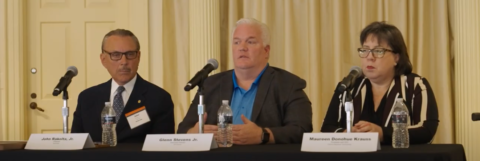Glenn Stevens Jr. joined the Southeast Michigan Council of Governments (SEMCOG) at their General Assembly on June 23 to discuss Michigan’s place in the race for large corporate investments in the automotive and mobility industry. SEMCOG shared the summary of the event below:
SEMCOG
June 27, 2022
Chris Barnett
At SEMCOG’s General Assembly meeting last week in Dearborn, it was my privilege to facilitate a panel discussion on the status of our state in the competition for large corporate investments in the rapidly evolving auto industry.
The window to evolve our region’s infrastructure, talent, and industrial ecosystem is closing fast. The automotive industry is in the midst of historic disruption and innovation. Electric vehicles (EVs), connected- and autonomous vehicle (CAV) technologies, and the ongoing acceleration of an online-based economy are changing the ways people, goods, and services move.
Michigan has a limited opportunity to sustain and reinvent its leadership role in the mobility sector. The discussion featured three of the region’s pre-eminent experts on the topic:
- Maureen Donohue Krauss, President and CEO, Detroit Regional Partnership
- Ambassador John Rakolta, Jr. (ret), Chairman, Walbridge
- Glenn Stevens, Executive Director, MICHauto
Each of them brought an essential perspective on what it will take to leverage our significant legacy in the internal combustion engine (or ICE)-based automotive industry as springboard into competitive success in the EV landscape. One thing was clear before, during, and after the discussion: the need for all levels of government to work with business and education leaders to evolve.
Glenn Stevens, Jr., Executive Director, MICHauto rates Michigan’s current status in the competition for mobility investment at 5/10
MICHauto was established in 2007 to compete with southern states that had automotive associations when Michigan did not, and Glenn Stevens sees his job with MICHauto as providing a statewide voice that ties everyone in the industry together. Like Krauss, Stevens thinks Michigan is currently performing at 5/10 and that we are doing a lot of things right:
- There is a lot of collaboration and communication in Michigan right now.
- We are the epicenter of North America’s automotive industry because you will not find anything like what we have in our cluster. Stevens cited our 26 OEMs (original equipment manufacturers) with R&D or technical centers but reminds us that it is not our birthright.
- Coordinated support from the business community, legislature, and other leaders have helped to ensure funding for incentives we did not have, supporting new and renewed investment in our state.
Based on many of the same challenges described by Rakolta and Krauss, Stevens agreed that we are struggling to be competitive. He cited the following challenges and offered some suggestions for addressing them:
- Utility costs, site availability, and incentives are all essential areas for improvement.
- Perceptions of community are a huge area for improvement, and this is a place that local governments can make a difference.
- We have to grow our knowledge-based, digital economy jobs regardless of industry and increase labor force participation because this is how our talent will be measured in the future.
- While diversification has traditionally been a challenge for our auto-centric region, the auto industry is a great platform for diversification thanks to core competencies developed to support digital evolution of automotive manufacturing.

